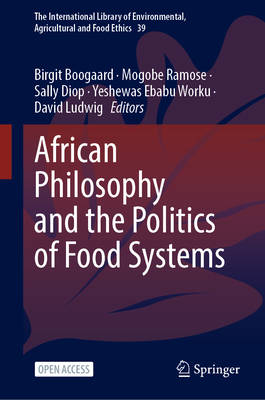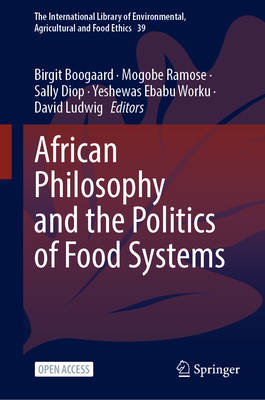
- Retrait gratuit dans votre magasin Club
- 7.000.000 titres dans notre catalogue
- Payer en toute sécurité
- Toujours un magasin près de chez vous
- Retrait gratuit dans votre magasin Club
- 7.000.0000 titres dans notre catalogue
- Payer en toute sécurité
- Toujours un magasin près de chez vous
African Philosophy and the Politics of Food Systems
91,95 €
+ 183 points
Description
This open access edited volume argues that food systems need to be questioned on ethical and epistemic grounds, and firmly posits African philosophy as a valuable and much-needed source in doing so. It presents critical perspectives on the ethical and epistemic complexities of food systems whilst also providing a practical outlook through success stories of food systems underpinned by African ways of thinking and doing. The central premise is the necessity of taking an intercultural approach in examining and re-thinking food systems successfully, which means to draw from and do justice to a diversity of knowledge. As such, it sets out to challenge the status quo and the prevailing western dominant narrative whilst asserting its importance alongside other forms of knowledge in tackling issues in the food system. The book introduces the reader into the politics of food systems, while highlighting the relevance of African philosophy through illuminating the relationship between ongoing western hegemony and the violation of the universal human right to food. Case studies across the continent are presented to unearth and critique inequalities and injustices in various domains of Africa's agricultural sector, ranging from seed systems to markets. However, first and foremost, the book presents African philosophy as an essential source for bringing back balance and justice in food systems that can feed all. To this end, the book starts from African philosophy, such as ubu-ntu, Akan and Shona Philiosophy, and illustrates ethical and epistemic inquiries with real-life examples in practice. This is a must-read for both academics and advanced (masters-level) students interested in African perspectives on food systems.
Spécifications
Parties prenantes
- Editeur:
Contenu
- Nombre de pages :
- 291
- Langue:
- Anglais
- Collection :
- Tome:
- n° 39
Caractéristiques
- EAN:
- 9783032035189
- Date de parution :
- 16-11-25
- Format:
- Livre relié
- Format numérique:
- Genaaid
- Dimensions :
- 155 mm x 235 mm

Les avis
Nous publions uniquement les avis qui respectent les conditions requises. Consultez nos conditions pour les avis.





